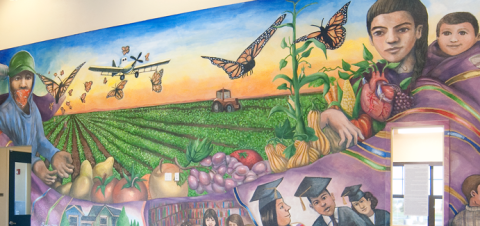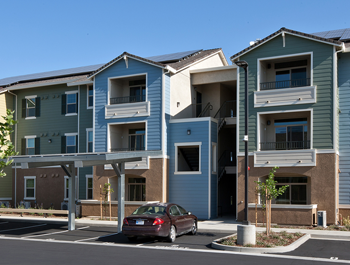Image

Rachel Iskow, Executive Director, Mutual Housing California
Challenge: In California, where residential rental costs have significantly outpaced income growth, the housing crisis for agricultural workers and their families has long been at a crisis point. Farm workers have some of the most dangerous and unhealthy jobs and are most in need of homes that are affordable, safe and healthy.
Located in California's North Central Valley, Yolo County has over 5,000 year-round jobs in the agricultural sector. The Central Valley is the biggest producer of produce in the state, and provides over half of the nation's vegetables, fruits and nuts. While workers on farms, in packing houses and processing plants are the backbone of this agricultural economy, they suffer from a critical shortage of affordable housing in the county, and are often relegated to over-crowded and unsafe housing conditions.
The Yolo County incorporated town of Woodland is not immune to California's rapidly rising residential rents. Situated a few minutes from the prestigious University of California, Davis, Woodland is often a place where university employees and students settle. A steady flow of new, affluent residents creates pressure on the rental housing supply in Woodland. Agricultural workers, who have relatively low incomes, are among those least able to compete for scarce, high-quality rental housing.
In 2010, in an effort to alleviate the agricultural workers' housing crisis, Mutual Housing California sent out its multilingual team to interview workers on the farms, in processing plants and in packing houses. Mutual Housing conducted one-on-one interviews, asking workers their greatest housing concerns, what amenities were important and how much they were paying for housing. What surprised us were the high utility bills that workers received. Low income, high utility bills and expensive rent left little for other necessities or savings.
 Mutual Housing selected Housing Development Project Manager Vanessa Guerra to coordinate the development of what would become Mutual Housing at Spring Lake. For Guerra, the work on this Woodland housing development was personal. She was raised in a farmworker family in Yolo County. She and her brothers were the first in their family to get college degrees. Guerra has a bachelor's degree in engineering and construction management and is a certified green building professional. Having lived in substandard housing, Guerra knew the challenges agricultural workers faced, and understood their desire to raise children who would have brighter futures.
Mutual Housing selected Housing Development Project Manager Vanessa Guerra to coordinate the development of what would become Mutual Housing at Spring Lake. For Guerra, the work on this Woodland housing development was personal. She was raised in a farmworker family in Yolo County. She and her brothers were the first in their family to get college degrees. Guerra has a bachelor's degree in engineering and construction management and is a certified green building professional. Having lived in substandard housing, Guerra knew the challenges agricultural workers faced, and understood their desire to raise children who would have brighter futures.Guerra looked very closely at the goal of lowering utility bills for agricultural workers, the future occupants of the housing she would develop. Guerra became committed to developing Mutual Housing's first zero net energy housing -- housing designed to produce as much energy on site, through solar photo voltaics, as would be consumed by residents and management. Mutual Housing worked with energy consultants, architects and construction firms to create the Spring Lake development.
As of May 2015, Mutual Housing at Spring Lake became home to 62 families who have earned income from agriculture or who are retired agricultural workers. The families enjoy new parks, a walking path, an onsite community room, a computer learning center, a bike-lending library, computer tablets that can be borrowed to take home and free internet access for all households.
New resident Marisol Sanabria said that, in other places she lived she was always worried about the utility costs. At Mutual Housing, however, Sanabria says: "In total, for the five months we have been living here, [the utility bill] has come out to under $30."
In 2015, the U.S. Department of Energy certified Mutual Housing at Spring Lake as the nation's first rental housing to achieve the Zero Energy Ready Home designation. In 2016, the property was awarded LEED Platinum Home Status.

